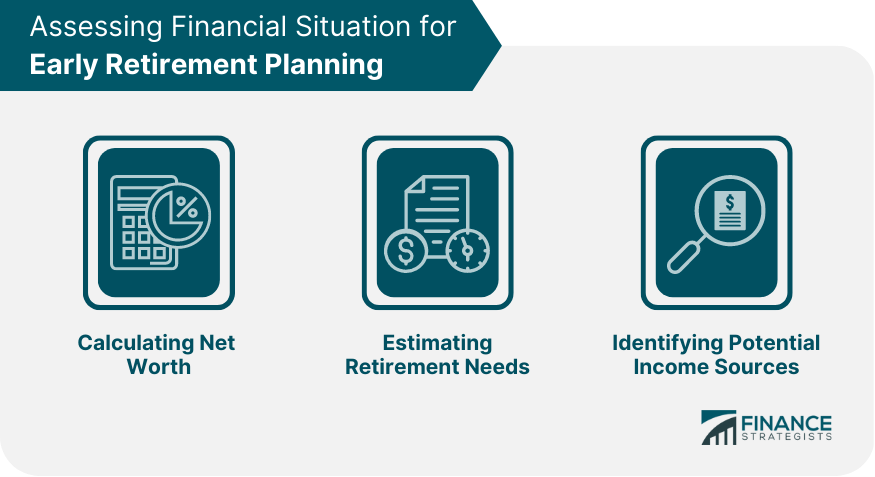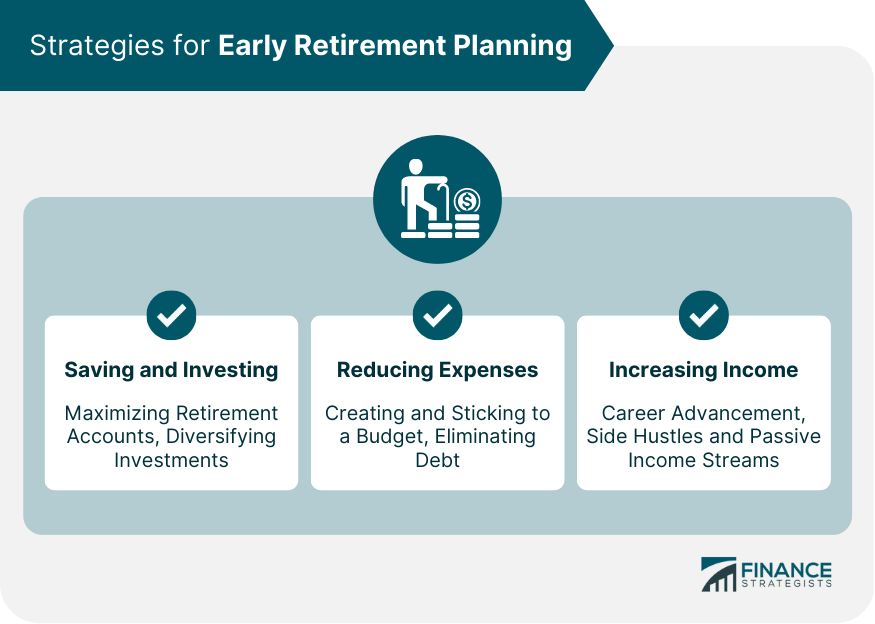Early retirement planning refers to the process of setting financial and lifestyle goals for retiring before the standard retirement age. It involves creating a comprehensive plan that includes saving, investing, budgeting, and managing debt, as well as considering factors such as healthcare, Social Security benefits, and tax implications. Early retirement planning is important because it allows individuals to take control of their financial future and achieve their retirement goals. By starting early, individuals can benefit from the power of compound interest and make strategic investment decisions to maximize their returns. Planning also allows individuals to identify potential obstacles and develop strategies to overcome them, such as paying off debt or increasing savings. Additionally, early retirement planning can provide peace of mind and reduce financial stress, allowing individuals to enjoy their retirement years without worrying about money.
I'm Taylor Kovar, a Certified Financial Planner (CFP), specializing in helping business owners with strategic financial planning. A couple I advised dreamed of retiring by 50. Skeptical but hopeful, they embraced our aggressive saving and diversified investment strategy early on. By automating savings, cutting unnecessary expenses, and optimizing their portfolio for long-term growth, they not only met their goal but did so two years ahead of schedule. Let's chat about how you can tailor a plan to meet your retirement dreams ahead of time, too. Contact me at (936) 899 - 5629 or [email protected] to discuss how we can achieve your financial objectives. WHY WE RECOMMEND: IDEAL CLIENTS: Business Owners, Executives & Medical Professionals FOCUS: Strategic Planning, Alternative Investments, Stock Options & Wealth Preservation The first step in early retirement planning is to calculate your net worth. This involves adding up all your assets, such as savings, investments, and property, and subtracting your liabilities, such as mortgages, loans, and credit card debts. Knowing your net worth provides a clear picture of your current financial standing and helps set realistic retirement goals. Next, estimate the amount of money you will need to maintain your desired lifestyle during retirement. Consider factors like housing, healthcare, utilities, food, and leisure activities. Use online retirement calculators to determine the necessary savings and investment growth rates to achieve your goals. Identify all potential income sources during retirement, such as Social Security, pensions, investments, and rental income. These sources will play a crucial role in funding your retirement expenses. Make the most of tax-advantaged retirement accounts, such as 401(k)s and IRAs. Contribute as much as possible to these accounts and take advantage of employer matching, if available. These accounts help grow your savings tax-free or tax-deferred, significantly impacting your retirement fund. Diversify your investment portfolio with a mix of stocks, bonds, and real estate. This helps to spread risk and enhance potential returns. Consult with a financial advisor to create a balanced and diversified investment strategy based on your risk tolerance and retirement goals. Develop a detailed budget to track your income and expenses. Identify areas where you can cut costs and redirect those savings toward your retirement goals. Consistently monitor your budget and make adjustments as needed. Eliminate high-interest debt, such as credit card balances and personal loans, as soon as possible. Reducing or eliminating debt lowers your overall expenses and allows you to save more for retirement. Seek opportunities for career advancement and negotiate higher salaries to increase your income. This additional income can be directed toward your retirement savings and investments. Consider pursuing side hustles or developing passive income streams, such as rental properties or dividend-paying stocks, to supplement your primary income. This additional revenue can help you reach your retirement goals faster. Learn about the Social Security system and the benefits you can expect to receive during retirement. Determine the optimal claiming age based on your individual circumstances to maximize your lifetime benefits. If you are eligible for a pension, understand the plan's rules and benefits. Determine the best time to start receiving pension payments and consider options like lump-sum payouts or annuity payments. Consider the impact of early retirement on your Social Security and pension benefits. Early retirement may result in reduced benefits, which could affect your overall retirement income. Plan for healthcare expenses in retirement, as they can be a significant portion of your overall expenses. Estimate your potential healthcare costs based on factors like age, medical history, and location. Understand Medicare eligibility and coverage, as well as options for supplemental insurance. Determine which plans best suit your needs and budget. Keep in mind that enrolling in Medicare and supplemental insurance may have specific deadlines and penalties for late enrollment. Consider purchasing long-term care insurance to cover potential expenses related to assisted living, nursing homes, or in-home care. Evaluate different policies and weigh the costs against the potential benefits. Develop tax-efficient withdrawal strategies to minimize taxes on your retirement income. This may involve strategically withdrawing from different accounts or adjusting your income to stay within lower tax brackets. Consult with a tax professional to optimize your withdrawal strategy. Create a comprehensive estate plan to protect your assets and ensure they are distributed according to your wishes. This includes creating a will, establishing trusts, and designating power of attorney. Consult with an estate planning attorney to develop a plan that meets your needs and objectives. Consider your desired retirement lifestyle, including factors like housing, travel, hobbies, and social activities. Determine the associated costs and incorporate them into your overall retirement plan. Prepare for the emotional and psychological adjustments that come with retirement, such as changes in daily routines, social interactions, and identity. Develop strategies to cope with these changes and maintain a fulfilling and balanced lifestyle. Identify hobbies, travel plans, and volunteer opportunities to enrich your retirement experience. These activities can provide a sense of purpose, personal fulfillment, and social engagement during retirement. Monitor your retirement plan regularly to assess your progress towards your goals. Make necessary adjustments based on changes in your financial situation, goals, or market conditions. Be prepared to adapt your retirement plan to changes in your income, expenses, or goals. This may involve adjusting your savings rate, investment strategy, or retirement timeline. Work with a financial advisor to help you develop, implement, and adjust your retirement plan as needed. A professional can provide valuable guidance and expertise to help you achieve your retirement goals. Early retirement planning is a crucial step toward achieving financial independence and a fulfilling retirement. By evaluating your financial situation, identifying potential income sources, and implementing effective saving and investing strategies, you can ensure your retirement years are secure and stress-free. Additionally, understanding the impact of healthcare, taxes, and lifestyle choices can help you create a comprehensive retirement plan that meets your needs and objectives. It is essential to monitor and adjust your retirement plan regularly to stay on track and adapt to changes in your income, expenses, or goals. Working with a financial advisor can provide valuable guidance and expertise to help you achieve your retirement goals. With proper planning and execution, you can confidently look forward to a comfortable and enjoyable retirement. Remember, it's never too early to start planning for your future. Start planning today and take control of your financial future.What Is Early Retirement Planning?
Read Taylor's Story

Fee-Only Financial Advisor
Certified Financial Planner™
3x Investopedia Top 100 Advisor
Author of The 5 Money Personalities & Keynote Speaker
Assessing Financial Situation for Early Retirement Planning
Calculating Net Worth
Estimating Retirement Needs
Identifying Potential Income Sources

Strategies for Early Retirement Planning
Saving and Investing
Maximizing Retirement Accounts
Diversifying Investments
Reducing Expenses
Creating and Sticking to a Budget
Eliminating Debt
Increasing Income
Career Advancement
Side Hustles and Passive Income Streams

Social Security and Pensions in Early Retirement Planning
Understanding Social Security Benefits
Maximizing Pension Benefits
Impact of Early Retirement on Benefits
Health Care and Insurance in Early Retirement Planning
Health Care Expenses in Retirement
Medicare and Supplemental Insurance
Long-Term Care Insurance
Tax and Estate Planning in Early Retirement
Tax-Efficient Withdrawal Strategies
Estate Planning Essentials
Lifestyle Considerations for Early Retirement Planning
Determining Desired Retirement Lifestyle
Adjusting to Life After Retirement
Pursuing Hobbies, Travel, and Volunteering
Monitoring and Adjusting Your Plan
Regularly Reviewing Your Progress
Adapting to Changes in Income, Expenses, or Goals
Consulting With a Financial Advisor
Conclusion
Early Retirement Planning FAQs
Early retirement planning is the process of creating a financial plan and strategy to retire before the typical retirement age. It involves setting financial goals, assessing savings, investments, and debt, and making lifestyle changes to achieve a comfortable retirement.
Planning for early retirement allows you to take control of your financial future, reduce financial stress, and achieve your retirement goals. It also provides you with the flexibility to pursue your passions and interests while you're still healthy and active.
The benefits of early retirement planning include having more control over your finances, achieving financial independence, having more time to travel and pursue hobbies, and being able to retire on your own terms.
It's best to start planning for early retirement as early as possible. The earlier you start, the more time you have to save and invest, and the more flexibility you have in making financial decisions.
To plan for early retirement, you should set a retirement goal, assess your current financial situation, create a savings and investment plan, reduce debt, and adjust your lifestyle to live below your means. You should also work with a financial advisor or planner to create a customized retirement plan based on your goals and financial situation.
True Tamplin is a published author, public speaker, CEO of UpDigital, and founder of Finance Strategists.
True is a Certified Educator in Personal Finance (CEPF®), author of The Handy Financial Ratios Guide, a member of the Society for Advancing Business Editing and Writing, contributes to his financial education site, Finance Strategists, and has spoken to various financial communities such as the CFA Institute, as well as university students like his Alma mater, Biola University, where he received a bachelor of science in business and data analytics.
To learn more about True, visit his personal website or view his author profiles on Amazon, Nasdaq and Forbes.















